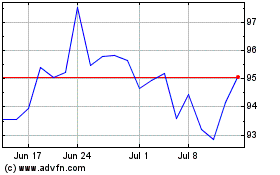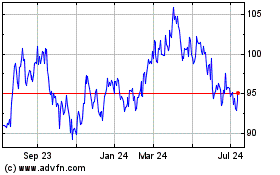By Christopher M. Matthews
HOUSTON -- Oil refineries here are starting to come back online
as the epicenter of the U.S. energy industry begins to recover from
Hurricane Harvey. But getting the fuel flowing again isn't as easy
as flipping a switch, and some key transport infrastructure remains
down.
When Harvey inundated the Texas coast last month, it closed
about 25% of U.S. refining capacity. Six Gulf Coast refineries,
accounting for 9% of U.S. refining capacity, remained closed as of
Tuesday afternoon, according to the Energy Department. Another five
were in the process of restarting, and at least seven were running
at reduced rates.
Saudi Arabian Oil Co. said Tuesday it was in the initial phases
of restarting its Motiva refinery, the country's largest. But it
said that the Port Arthur, Texas, facility, which can make 600,000
barrels of fuel a day, may be running at just 40% of capacity by
the end of this weekend. And Exxon Mobil Corp. said over the
weekend it was working toward restarting its Baytown refinery, the
nation's second-largest.
Gasoline prices have jumped in the past week. Nationwide, the
average gasoline price was $2.65 a gallon Tuesday, 30.2 cents
higher than a month ago, according to AAA. At the same time,
gasoline futures fell Tuesday as news emerged that fuel facilities
were coming back online.
At LyondellBasell Industries NV, Chief Executive Bhavesh V.
Patel left work before the hurricane made landfall on Aug. 25
confident that his company had done all it could to prepare its
Houston refinery for the storm.
Operators at the 268,000-barrel-a-day facility knew the greatest
threat was flooding, and had spent the week draining water from the
site's dykes and retention pools and inspecting pumps and
electrical infrastructure. Their goal was to avoid a complete
shutdown and a potentially dangerous start-up.
Then, 50 inches of rain fell.
LyondellBasell's Houston refinery did continue running
throughout the storm, one of a handful in the area to do so. But
the company had to cut back production, mainly because it couldn't
get in enough shipments of crude oil or find a way to move out its
shipments of refined fuel.
Flooding caused the closure of the Houston Ship Channel, which
enables tankers laden with crude to move from the Gulf of Mexico to
area refineries. LyondellBasell continued to receive shipments from
Canada via pipeline, but not enough to operate at full
capacity.
At the other end, LyondellBasell also couldn't move its refined
fuel product through the ship channel, creating the risk of running
out of storage space. Outages on the Colonial Pipeline, which
transports gasoline from the Gulf to New York, exacerbated storage
woes, officials said.
"Not only are you trying to conserve what you're consuming to
keep this thing running, but you also don't want to fill up your
storage of products and have no way out," Mr. Patel said.
The goal was to stretch out supplies and storage space enough to
keep the refinery running, even if barely. A complete restart of a
refinery can take weeks and poses serious risks. The primary danger
is human error -- starting back up often requires hundreds of new
workers to come in and perform tasks outside ordinary operations.
In 2005, 15 workers were killed during a start-up at a Texas City
refinery, at the time owned by BP PLC, when a vapor cloud
ignited.
At LyondellBasell's Houston refinery, which primarily processes
heavy crude, workers are now in a pre-startup phase, checking
electrical systems, pressure levels, steam supply, flaring and
instrumentation. But fully resuming normal operations will require
Houston's infrastructure to be up and running. Company officials
declined to say how long that will take.
The ship channel is now open but not at full capacity. Rail
networks remain hampered, and pipelines are still not running at
normal levels.
LyondellBasell's employees are also in recovery mode. Some 100
employees out of a total of 850 at the Houston refinery were
affected by the storm. Sixteen lost everything, company officials
said.
The company found hotels for employees who lost their homes, set
up a relief fund for employees and is giving paid time off for
those affected by the storm to work on their homes. The company
operates nine sites along the Gulf of Mexico, and more than 5,000
of its employees were in the storm's path.
Most employees at the company's operations on the Gulf were sent
home ahead of the storm. Plants were staffed by so-called ride-out
crews, who spent five days working 12-hour shifts, sleeping on cots
in between.
Mr. Patel worked around the clock from his West Houston home,
listening to operations briefings while monitoring the water levels
of two reservoirs that flooded neighborhoods near his home.
All but the company's chemical complex in Matagorda, Texas,
where the Brazos River caused severe flooding, managed to continue
operating.
Mr. Patel said that Houston and the oil-and-gas industry need to
think about infrastructure and the resilience of logistics
facilities long-term. The city has had a major flood annually for
the last three years and needs to prepare itself for more, he said,
adding, "We've got to think about these events more seriously,
about being able to handle them."
--Dan Molinksi contributed to this article.
(END) Dow Jones Newswires
September 06, 2017 07:14 ET (11:14 GMT)
Copyright (c) 2017 Dow Jones & Company, Inc.
LyondellBasell Industrie... (NYSE:LYB)
Historical Stock Chart
From Mar 2024 to Apr 2024

LyondellBasell Industrie... (NYSE:LYB)
Historical Stock Chart
From Apr 2023 to Apr 2024
